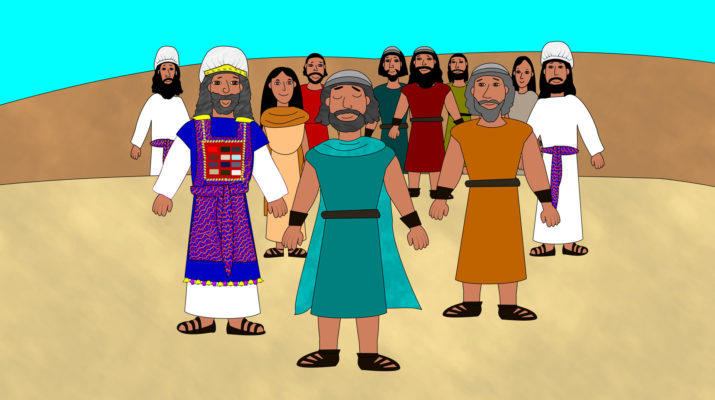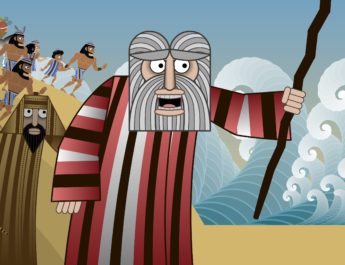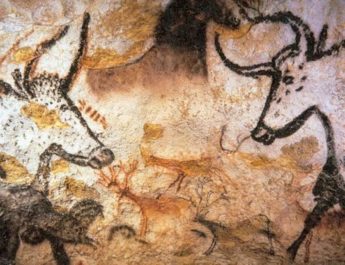Joshua 24:1-2a, 14-18
Ordinary B39
1 Then JoshuaA gatheredB all the tribesC of IsraelD to Shechem,E
A “Joshua” = Yehoshua. From YHVH (proper name of the God of Israel; the self-existent and eternal one); {from havah (to become) or from hayah (to come to pass, become, be)} + yasha (to deliver, defend, help, preserve, rescue; properly, to be open, wide or free, which implies being safe. So, in a causative sense, this is to free someone). This is Joshua, Jeshua, or Yehoshua, which means “the Lord is salvation.”
B “gathered” = asaph. This is to gather, assemble, or bring. It can also mean to take away, destroy, or remove.
C “tribes” = shebet. This is a rod, staff, club, scepter, dart, or tribe. Literally a stick that can be used for punishing, writing, fighting, walking, ruling; thus, used figuratively for a clan.
D “Israel” = Yisrael. From sarah (to persist, exert oneself, contend, persevere, wrestle, prevail) + el (God or god). This is Israel, meaning God strives or one who strives with God; new name for Jacob and for his offspring. This refers to the people and to the land.
E “Shechem” = Shekem. From the same as shekem (shoulder, neck, or some other place that bears burdens; figuratively, the spur of a hill, or one’s allotted portion); from shakam (to rise early, begin work early; properly, this is leaning one’s shoulder or back into a load or a burden; also, loading an animal for work). This is Shechem, meaning “ridge.”
and summonedF the elders,G the heads,H the judges,I and the officersJ of Israel;
F “summoned” = qara. This is to call or call out – to call someone by name. Also used more broadly for calling forth.
G “elders” = zaqen. From the same as zaqan (beard or chin – the beard represents old age). This is old, aged, or elder.
H “heads” = rosh. This may come a word that means to shake. It is the head, captain, or chief. It can also be excellent or the forefront. It can be first in position or in statue or in time (i.e. the beginning).
I “judges” = shaphat. This is to judge, defend, pronounce judgment, condemn, or govern. It can refer to God judging or to human judges. This is pronouncing a verdict in favor or against so it implies consequences or punishment. It can also mean to litigate or govern as one with authority.
J “officers” = shoter. The root may mean write. This is perhaps originally a scribe and so it was used more broadly for an official, officer, ruler, overseer, or magistrate.
and they presentedK themselves beforeL God.M
K “presented” = yatsab. This is to set oneself, take a stand, remain, continue, to station or set something in place.
L “before” = paneh. From panah (to turn, face, appear). This is face in a literal or figurative sense. It could be face, presence, anger, respect. It can also be used of God to indicate divine favor or presence.
M “God” = Elohim. Related to “Israel” in v1. See note D above.
2 And Joshua said to all the people,N “Thus says the Lord,O the God of Israel: Long agoP your ancestorsQ—
N “people” = am. From amam (to darken, hide, associate; creating shadows by huddling together). This is people or nation. It can be used specifically for a tribe, collectively of troops or armies, or figuratively to refer to a flock of animals.
O “Lord” = YHVH. Related to “Joshua” in v1. See note A above.
P “long ago” = olam. This is a long scope of time whether in the past (antiquity, ancient time) or in the future (eternal, everlasting).
Q “ancestors” = ab. This is father, chief, or ancestor. It is father in a literal or figurative sense.
TerahR and his sonsS AbrahamT andU NahorV—
R “Terah” = Terach. 13x in OT. Perhaps from tarah (to turn, wander) OR from tor (dove) + ruach (breath, wind, air, cool, spirit; wind, which resembles the breath; figuratively, life itself or being frail/mortal/impermanent; air of the sky or the spirit). This is Terah or Terach, maybe meaning “delay, “wanderer,” or “global spirit.” See https://www.abarim-publications.com/Meaning/Terah.html#.X2Tov2hKhPY
S “sons” = ab. Literally, “the father of.” Same as “ancestors” in v2. See note Q above.
T “Abraham” = Abraham. Related to “ancestors” in v2. From the same as Abiram (exalted father, a high father – lofty) {from ab (see note Q above) + rum (rise, bring up, being high, extol, exalt, haughty; to raise in a literal or figurative sense)}. This is Abraham, father of many nations or father of a multitude.
U {untranslated} = ab. Literally, “the father of.” Same as “ancestors” in v2. See note Q above.
V “Nahor” = Nachor. 18x in OT. From the same as nachar (nostril or snorting; root means to snort or snore). This is Nachor or Nahor, meaning “snorer.”
livedW beyondX the EuphratesY and servedZ other gods.AA
W “lived” = yashab. This is to sit and so to remain and so to dwell. It is sitting for any reason – as a judge, in order to ambush, or just sitting quietly. Causatively, this can mean settling or marrying. This can also mean continue, endure, or establish.
X “beyond” = eber. From abar (to pass over, pass through, or pass by; cross over or to alienate; used for transitions). This is the place across or beyond, by, from, other, the opposite side, against, over. It often refers to the other side of the Jordan river or toward the east.
Y “Euphrates” = nahar. From nahar (to flow, sparkle, be cheerful). This is a stream, river, or flood. Particularly used for the Nile or Euphrates. Figuratively, this can mean prosperity.
Z “served” = abad. This is to work, serve, or compel. It can describe any kind of work or service (including religious devotion). Also, till or cultivate. Used causatively, it can mean to enslave or keep in bondage.
AA “gods” = elohim. Same as “God” in v1. See note M above.
14 “Now therefore revereBB the Lord, and serve him in sincerityCC and in faithfulness;DD put awayEE the gods that your ancestors served beyond the River and in Egypt,FF and serve the Lord.
BB “revere” = yare. This is to fear, be afraid, dreadful. It can also refer to fearful reverence – to fear in a moral sense is to say to revere, respect.
CC “sincerity” = tamim. From tamam (to finish or accomplish; to make perfect, demonstrate that you are upright; consume; to complete in a literal or figurative sense). This is entire in a literal or figurative sense. So, it could be complete, full, intact, or without defect. Alternately, it could refer to being sound, having integrity, being sincere or perfect.
DD “faithfulness” = emet. From aman (to believe, endure, fulfill, confirm, support, be faithful, put one’s trust in, be steadfast. Figuratively, this is to be firm, steadfast, or faithful, trusting, believing, being permanent, morally solid). This is firmness or stability. Figuratively, it is faithfulness, truth, or trustworthiness. This is the same root that “amen” comes from.
EE “put away” = sur. This is to turn aside in a literal or figurative sense – to depart, decline, rebel, remove, or withdraw.
FF “Egypt” = Mitsrayim. Perhaps from matsor (besieged or fortified place, bulwark, entrenchment; something hemmed in; a siege or distress or fastness); from tsur (to confine, besiege, to cramp). This is Egypt.
15 Now if you are unwillingGG to serve the Lord, chooseHH this dayII whom you will serve,
GG “are unwilling” = ra’ + ayin. Literally, “it seems evil in your sight.” Ra’ is from ra’a’ (to be evil, bad, afflict; properly, to spoil – to destroy by breaking into pieces; figuratively, to cause something to be worthless; this is bad in a physical, social, or moral sense; that which displeases, to do harm or mischief, to punish or vex). This is bad, disagreeable, that which causes pain, misery, something having little or no value, something that is ethically bad, wicked, injury, calamity. This refers to anything that is not what it ought to be – a natural disaster, a disfigurement, an injury, a sin. Ayin is eye in a literal or figurative sense so eye, appearance, favor, or a fountain (the eye of the landscape).
HH “choose” = bachar. This is to choose, appoint, try, excellent.
II “day” = yom. Root may mean being hot. This is the day in a literal or figurative sense. It can also mean birth, age, daylight, continually or other references to time.
whether the gods your ancestors served in the region beyond the River or the gods of the AmoritesJJ in whose landKK you are living; but as for me and my household,LL we will serve the Lord.”
JJ “Amorites” = Emori. From amar (to speak, say, answer, command, promise, report). This is Amorite or Emori, perhaps meaning talkers.
KK “land” = erets. Root may mean to be firm. This is earth, ground, field land, or country.
LL “household” = bayit. Probably from banah (to build, make, set up, obtain children; to build literally or figuratively). This is house, court, family, palace, temple.
16 Then the people answered,MM “Far be itNN from us that we should forsakeOO the Lord to serve other gods; 17 for it is the Lord our God who brought us and our ancestors upPP from the land of Egypt, out of the houseQQ of slavery,RR
MM “answered” = anah. This is answer, respond, announce, sing, shout, or testify. It means to pay attention, which implies responding and, by extension, starting to talk. Used in a specific sense for singing, shouting, testifying, etc.
NN “far be it” = chalilah. From chalal (to defile, pollute). This is literally something that is profaned. It is used to mean “God forbid” or “far be it.”
OO “forsake” = azab. To loosen, relinquish, permit, forsake, fail, leave destitute.
PP “brought…up” = alah. This is to go up, approach, ascend, be high, be a priority; to arise in a literal or figurative sense.
QQ “house” = bayit. Same as “household” in v15. See note LL above.
RR “slavery” = ebed. Related to “served” in v2. From abad (see note Z above). This is a servant, slave, or bondservant.
and who didSS those greatTT signsUU in our sight.VV
SS “did” = asah. This is to make, do, act, appoint, become in many senses.
TT “great” = gadol. From gadal (to grow up, become great, become wealthy – to advance. The root meaning may be to twist in the sense of the process of growing). This is great, high, bigger, noble, old, marvelous. It can also refer to someone who is powerful or distinguished.
UU “signs” = oth. From avah (to mark, sign, point out); OR from uth (to agree). This is a sign in a literal or figurative sense. It could be a flag or monument. It could be evidence or a mark. It could also be an omen or a miracle.
VV “sight” = ayin. Same as “are unwilling” in v15. See note GG above.
He protectedWW us along all the wayXX that we went,YY
WW “protected” = shamar. This is to keep, watch, or preserve. It means to guard something or to protect it as a thorny hedge protects something.
XX “way” = derek. From darak (to tread, march, to walk. Can also mean affixing a string to a box since one needs to step on it to bend it in the process; so also an archer). This is a road as a thing that is walked on. Can be used figuratively for the path that one’s life takes or how one chooses to live one’s life.
YY “went” = halak. This is go, come, walk. It is walk literally and figuratively and includes people and animals. It can be used figuratively for one’s moral life – how we walk according to God’s way or against it. It can also refer to the walk of life as in the course one’s life takes, the choices we make, etc.
and among all the peoples through whomZZ we passed;AAA 18 and the Lord drove outBBB beforeCCC us all the peoples, the Amorites who lived in the land. Therefore we also will serve the Lord, for he is our God.”
ZZ “through whom” = qereb. Perhaps from qarab (to come near or approach). This is among, in the midst, before, the center It is the inward part, whether literal or figurative. It can also be used for the heart, the site of thoughts and feelings. This word is also used as a technical term for the entrails of the animals who are sacrificed.
AAA “passed” = abar. Related to “beyond” in v2. See note X above.
BBB “drove out” = garash. This is to cast out or expel. It can be to exile someone or to divorce them.
CCC “before” = paneh. Same as “before” in v1. See note L above.
Image credit: “Rahab and the Spies” by Sue Bentley, 2015.




